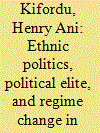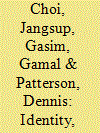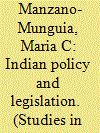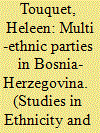|
|
|
Sort Order |
|
|
|
Items / Page
|
|
|
|
|
|
|
| Srl | Item |
| 1 |
ID:
109080


|
|
|
|
|
| Publication |
2011.
|
| Summary/Abstract |
This article explores the role played by a growing community of Mexican national entrepreneurs who are crafting a new form of Mexican nationalism in San Antonio, Texas. This population of Mexican business people is growing in size and influence in the city. The experiences of Mexican entrepreneurs differ from understood forms of Mexican immigration and acculturation to the United States. They differ from previous waves of affluent groups of political and religious Mexican refugees that flourished in San Antonio from 1908 through the 1940s. The integration and cultural adaptation experiences of Mexican entrepreneurs represent a new form of Mexican nationalism that engages both Mexican and American nationalisms in a bidirectional acculturation process. Blending attitudes, values, beliefs, and behaviours of both countries represent a new form of Mexican and American culture emerging in San Antonio at the beginning of the twenty-first century. To better understand the experiences and dynamics of these business people, this study builds on Pierre Bourdieu's principles of capital and power.
|
|
|
|
|
|
|
|
|
|
|
|
|
|
|
|
| 2 |
ID:
109082


|
|
|
|
|
| Publication |
2011.
|
| Summary/Abstract |
Since the 1960s, intermittent social conflicts in Nigeria appear mostly linked to ethnic groups' differences. Considering the importance of regime change in social and political stability, this article critically analyses the historic and dynamic role of the core political executive elite in the political system's stability. The article argues that ethnic politics persist in Nigeria based on the nature of interactions between political institutions, institution-builders, and society. It asserts a contradictory link between deep-rooted elite interests and popular preferences in ways that undermine orientations towards democracy. The empirical focus is on the composite nature of the core political executive elite analysed through their ethnic and educational backgrounds. It is observed that, although ethnic shocks are variously motivated, the atypical shape and inequity in power and role distribution at the highest levels of executive office-holding stand out as a salient source and target of antagonism by ethnic groups. This finding has a paradoxical implication: deep-seated economic and political interests of the elite play a diversionary role from the real causes of ethnic conflicts in Nigeria.
|
|
|
|
|
|
|
|
|
|
|
|
|
|
|
|
| 3 |
ID:
109078


|
|
|
|
|
| Publication |
2011.
|
| Summary/Abstract |
While work on the political behaviour of religious groups in America has shown that, among other things, religious commitment and strong opinions on salient issues can encourage turnout and raise the probability of these groups' members voting in national elections, much less is known about these relationships with respect to Muslim Americans. Using data collected at mosques in 2006 during the holy month of Ramadan, this article maps the turnout patterns of Muslim American respondents and then investigates the factors that explain the political participation of members of this increasingly important religious group. The article focuses on reported turnout in the 2004 presidential election and shows that, more than anything else, strong opinions on salient issues boosted the participation rates of members of this religious group in the election, even when controlling for other factors known to help explain turnout.
|
|
|
|
|
|
|
|
|
|
|
|
|
|
|
|
| 4 |
ID:
109081


|
|
|
|
|
| Publication |
2011.
|
| Summary/Abstract |
This article examines the socio-historical construction of Indian policy and legislation as the processes set out to making the 'Indian' population legible to its rulers during the pre- and post-confederation periods in Upper Canada. I aim to demonstrate how Indian policy and legislation materialised into concrete actions that attempted to assimilate, civilise, and protect the 'Indians' by deploying different instruments of control or governmentalities, such as the residential school and reserve system. Nonetheless, resistance and political positioning of Indigenous people is present, and post-confederation Indian policymaking in Canada is a much more negotiated process.
|
|
|
|
|
|
|
|
|
|
|
|
|
|
|
|
| 5 |
ID:
109084


|
|
|
|
|
| Publication |
2011.
|
| Summary/Abstract |
In the late 1970s, Italy switched from being a source of émigrés to becoming a recipient of immigrants. The city of Milan and its surrounding region led the way. A multitude of migrant associations sprang up as migrants pursued their quest for recognition as subjects and citizens. This study draws on the author's interviews with members of Milan's migrant associations to examine the inner dynamics both between migrants within associations, and between migrant members and those volunteers, both Italian and of other nationalities, who work with the associations. This study shows that the forms of solidarity and engagement offered by Italian activists represent a platform where the process of identity construction occurs and (mis)recognition practices are played out. As the article will point out, migrants are sometimes quite critical of the activities of Italian activists. In short, the study suggests that the consideration of two dimensions - identity and recognition - as they arise within everyday social practices, could make a useful contribution to the further study of the social phenomena of migrants' associations and political participation.
|
|
|
|
|
|
|
|
|
|
|
|
|
|
|
|
| 6 |
ID:
109083


|
|
|
|
|
| Publication |
2011.
|
| Summary/Abstract |
To what extent is political mobilisation across ethnic boundaries possible in states with highly ethnicised state structures? This article explores the opportunities and obstacles that activists in Bosnia-Herzegovina meet when they seek to develop integrative discourses as a basis for political action. The first part of the article focuses on the role of multi-ethnic parties in deeply divided societies. The second part develops alternative ideas on the obstacles facing multi-ethnic parties in Bosnia, focusing on the case of Naša Stranka, a political party that was established by civil society actors. There are two conclusions to be drawn. First, despite the centrifugal nationalisms that seem to dominate the top political level, there are civil society actors in Bosnia who engage in integrative political mobilisation. Second, these actors face difficulties that go beyond the often-cited problem of the tendency of the constitutional state structure to reify ethnic identities.
|
|
|
|
|
|
|
|
|
|
|
|
|
|
|
|
| 7 |
ID:
109079


|
|
|
|
|
| Publication |
2011.
|
| Summary/Abstract |
In an effort to understand how supremacists may respond to future socio-political events, this article examines how White Aryan Resistance (WAR), as a major player in the White Supremacist Movement (WSM), conceptualises nationalism and who qualifies as a 'real' American. I use discourse analysis on two year's worth of WAR newsletters: twelve monthly issues before the September 11, 2001 terrorist attacks and twelve issues after this date. Only partial support is found for outcomes that the existing nationalism literature would predict, suggesting that those who research the right-wing must better understand the WSM's sense of status loss to adequately predict future violent action from these groups. I show that WAR did not increasingly target Arabs after the attacks, which may have enhanced their membership and mobilisation efforts, but that this decision was a rational response in the context of status threats and limited movement resources.
|
|
|
|
|
|
|
|
|
|
|
|
|
|
|
|
| 8 |
ID:
109085


|
|
|
|
|
| Publication |
2011.
|
| Summary/Abstract |
This article examines the role and importance of charisma in Tunku Abdul Rahman's leadership of the nationalist movement in Malaya in the 1950s. A Cambridge University-educated prince from the northern state of Kedah, the Tunku turned a disparate group of communal political parties into a potent nationalist movement, the Alliance Party, which secured independence from Britain within five years of its formation. Previous studies have focused largely on his political leadership of the movement and have not examined the element of the Tunku's charisma in the nationalists' campaign. This article examines the political charisma of this leader in the context of recent theories of charisma. Historical evidence indicates that his personal appeal or charisma significantly influenced support for the Tunku's leadership of the nationalist movement, and, at a certain stage, he had almost a cult following. Some of the Tunku's strategies and actions were highly risky and even bordered on the irrational; yet, they were fully embraced by his supporters. The phenomenon of charisma is useful in attempting to understand political galvanisation, such as that instigated by the Tunku, in a way that other theories of political mobilisation (such as legal-rational or traditional leadership) cannot. Drawing on a wide range of primary sources such as the Alliance Party documents and records of the Colonial Office, this article explores the Tunku's charisma as an explanatory factor in the rise of the nationalist movement in Malaya in the 1950s.
|
|
|
|
|
|
|
|
|
|
|
|
|
|
|
|
|
|
|
|
|